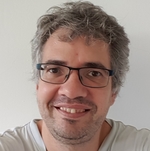Dr Robert Jehle (School of Environment & Life Sciences)
 Robert has worked at the University since 2008, when he was appointed as a Lecturer in Wildlife before being promoted to a Senior Lecturer in 2012. From 2011-2015 he was a Programme Leader of two linked BSc programmes in Wildlife Conservation, which together represent one of the largest areas of undergraduate teaching within the School of Environment and Life Sciences (ELS). Robert’s research revolves around population biological studies on mostly (but not only) amphibians, amongst others resulting in 60 indexed journal articles to date. Since joining ELS, Robert has been awarded external research income for more than ten projects, funded by organisations spanning from national grant agencies and governmental bodies, to the commercial sector.
Robert has worked at the University since 2008, when he was appointed as a Lecturer in Wildlife before being promoted to a Senior Lecturer in 2012. From 2011-2015 he was a Programme Leader of two linked BSc programmes in Wildlife Conservation, which together represent one of the largest areas of undergraduate teaching within the School of Environment and Life Sciences (ELS). Robert’s research revolves around population biological studies on mostly (but not only) amphibians, amongst others resulting in 60 indexed journal articles to date. Since joining ELS, Robert has been awarded external research income for more than ten projects, funded by organisations spanning from national grant agencies and governmental bodies, to the commercial sector.
From 2009-2015 he was the Chief Editor of the Herpetological Journal, which under his editorship reached the highest ISI impact factor of all global scientific journals devoted to amphibians and reptiles, and has been Associate Editor of the Wiley-Blackwell journal Animal Conservation since 2009. Representing the University on external bodies, Robert is currently a member of the Executive Committee of the World Congress of Herpetology, and a member of the IUCN Amphibian Specialist Group. He is also a Trustee of the Amphibian and Reptile Conservation Trust, which with about 30 staff members is the largest UK-based charity devoted to the conservation of amphibians and reptiles, as well as a Council Member of the Tropical Biology Association, a capacity-building NGO and a founding member of the Cambridge Conservation Initiative.
Dr David Pye (School of Environment & Life Sciences)
 David joined the University almost a decade ago, as a Lecturer in the School of Environment and Life Sciences; he currently teaches at all levels across a variety of degree programmes. He has been an active researcher in cancer treatment and the field of glycobiology for more than 25 years and has an extensive list of research publications. David is currently the Scientific Director of Kidscan, which operates out of the University and supports research into children’s cancer at Salford and at other national centres of excellence. In his role at Kidscan, David has encouraged members of university staff to apply for a growing portfolio of research support grants. This has seen the total funding awarded from Kidscan to the University, increase to a level in excess of £1 million since the charity was founded. He has also instigated a Kidscan funded grant scheme that allows university undergraduates to undertake a placement year in a children’s cancer research laboratory. This year has seen a record number of nine Kidscan grants awarded to support Salford students in their placement year.
David joined the University almost a decade ago, as a Lecturer in the School of Environment and Life Sciences; he currently teaches at all levels across a variety of degree programmes. He has been an active researcher in cancer treatment and the field of glycobiology for more than 25 years and has an extensive list of research publications. David is currently the Scientific Director of Kidscan, which operates out of the University and supports research into children’s cancer at Salford and at other national centres of excellence. In his role at Kidscan, David has encouraged members of university staff to apply for a growing portfolio of research support grants. This has seen the total funding awarded from Kidscan to the University, increase to a level in excess of £1 million since the charity was founded. He has also instigated a Kidscan funded grant scheme that allows university undergraduates to undertake a placement year in a children’s cancer research laboratory. This year has seen a record number of nine Kidscan grants awarded to support Salford students in their placement year.
David also has a keen interest in science policy and has worked in this area, with the learned societies, for many years. He is currently Honorary Policy Officer, Chair of the Policy Advisory Panel and Trustee of the Biochemical Society, which is the largest discipline-based learned society in the biosciences. This role allows him to ensure that issues faced at Salford make their way into government consultations on policy in HE and research.